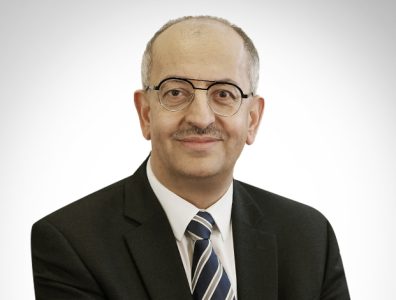
Khalid Al Begain, president of Kuwait College of Science and Technology (KCST), talks to The Energy Year about Kuwait’s progress on digital transformation and designing hands-on education for job market success. KCST is a private university that offers undergraduate programmes and professional certifications, including in oil and gas disciplines.
What steps is KCST taking to prepare its graduates for the job market?
Three years ago, we began intensifying our training courses at multiple levels to create a unique selling point for KCST graduates. We wanted to make them more attractive to employers. We already had a strong academic curriculum and a highly qualified faculty that boasts the highest research productivity in the Middle East, so we invested in hands-on learning.
Our facilities include AI, cybersecurity, IoT and robotics labs and a Maker Space and are unmatched in Kuwait. The executive director of the Association of Arab Universities once remarked that he hadn’t seen anything comparable elsewhere in the region. We have even developed the Middle East’s first university-based simulated cybersecurity operations centre for training. Graduates can earn EC-Council certifications such as CEH [Certified Ethical Hacker] and receive incident handling training directly on campus.
How is KCST contributing to digital transformation in Kuwait?
All our degrees are rooted in cutting-edge technology. While other universities cover a wide range of specialisations, we focus solely on high tech. With more than 1,200 students enrolled in computer engineering alone, we are Kuwait’s largest tech university.
We have partnered with institutions such as Bentley University in Boston and Bayes Business School of City, University of London to deliver executive programmes. We also created CICET, the Centre for Innovation, Continuing Education & Training, under which we have run more than 40 courses for the second consecutive year.
We offer customised, high-level training in leadership, AI, cybersecurity and finance. Digital transformation isn’t just about systems – it’s also about transforming mindsets. That’s where we lead.
What is your assessment of the pace of Kuwait’s digital transformation?
Kuwait has made tremendous progress between 2018 and 2023. The pandemic was a catalyst. The introduction of platforms such as Sahel simplified processes, and the recently announced digitised certificate verifications from the Ministry of Higher Education have improved a process that used to delay university operations.
While Kuwait is not yet a fully digital society, it has built the essential platforms. True digital transformation requires a shift in mentality and work culture, not just digitised tools. That transformation is well underway.
Absolutely. We are proactive in forming regional partnerships. For instance, we have signed agreements with the German Jordanian University, the Egypt-Japan University of Science and Technology and the Hussein Technical University of Jordan, which is supported by major players such as Microsoft and HP and focuses on job-market readiness.
Internationally, our flagship partner is IIT Delhi, one of the top global tech universities. We are also negotiating an exchange programme with a Japanese university and are currently hosting two French students in our AI lab. For a young university, we are proud of our global academic engagement.
We run regular public awareness sessions and conferences. In 2020, we hosted Kuwait’s first global 5G conference, and we have also organised several events on blockchain and fintech. Our Smart, Sustainable, and Secure symposium on IoT is in its second year, and we have partnered with Springer for a peer-reviewed publication.
We also launched an initiative in the form of an international forum and conference on AI and assistive technologies for special needs that has brought the United Nations to consider making Kuwait a base for their centre for assistive technology. The initiative is designed to empower people with special needs through digital tools.
Recently, we ran an AI and Robotics course for 35 disabled participants who built their own robots. This conference will be repeated in December 2025 alongside our Cybersecurity Education and Research Conference (CERC), which we organise in collaboration with the British Embassy and the National Cyber Security Centre.
The Green Room has evolved. It’s a fully off-grid room powered by solar glass panels, capable of running AC, a computer and a coffee machine. The vacuum-isolated glass ensures superior insulation; the inside surface remains cool when the outside is too hot to touch.
We are now integrating green hydrogen production into the project to create a green village prototype. Our partner Alpha Solar Tech supports the initiative, and a local investor plans to bring the technology to manufacture the necessary equipment in Kuwait, potentially positioning the country as a regional leader in this tech.
We tailor our training to regional needs and conduct job fairs to connect graduates with employers. Our employment rate is above 90% within three months of graduation. Even in conservative regions such as Jahra, we have seen a shift in mindsets. Families now send daughters to KCST, having heard about the quality of the education we offer.
We also focus on executive education for key sectors. For example, we designed OT [operational technology] security and instrumentation courses ideal for oil and gas professionals. Although KOC hasn’t onboarded us yet due to internal procurement bureaucracy, we continue to engage investors and firms in the energy ecosystem.
Our vision is to become Kuwait’s premier university of technology. We are already applying to expand into engineering disciplines such as civil, environmental and electrical engineering, and we will develop those programmes with an emphasis on renewable energy generation and smart grid management.
We have also signed an agreement with Bayes Business School to become the first digital business school in Kuwait. Together with them, we will offer fintech, digital marketing and tech-driven business education. We expect final approval from the authorities to get started soon.
With continued government support and private partnerships, we hope to make Kuwait proud. Whether it’s in digital transformation, assistive technology or energy innovation, we hope to continue preparing students for meaningful employment.
